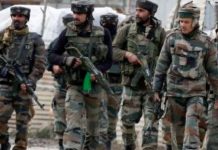
EDITED EXCERPTS FROM AN INTERVIEW
China suffered the most casualties in World War II after the Soviet Union, but both their contributions to the Allied victory have largely been glossed over. Why do you think that is the case?
For much of the Cold War, there was a reluctance to acknowledge the major contribution made by these two powers, which became enemies of the West after 1945. But there was an important difference between the USSR and China in the way they treated the war domestically. In Russia, the State did use the idea of the “great patriotic war” as a means to create national unity. In China, this wasn’t possible because Mao’s government couldn’t allow their predecessors, Chiang Kai-shek’s Nationalists, to gain any credit for having fought the Japanese. This meant that the only interpretation of the war in schools and movies was that the Communists had led the fighting and nobody else had much of a role. As the Nationalists had actually done the bulk of the fighting, this meant that the war could not be examined in a nuanced or detailed way under Mao.
The war is known more for the rise of Mao Zedong than for its contribution to the Allied war effort. Would the Communists have come to power had there been no war?
I think it would have been much harder for the Communists to come to power if war had not broken out between China and Japan in 1937. The “Long March” is now part of the foundation myth of the Chinese Communist Party. But at the time, it was really a defeat: the Nationalists had forced the Communists to withdraw from central China to the northwest. There was massive infighting within the Communist Party that was threatening to tear the party apart. The Communists were near to being wiped out, or rendered irrelevant, by 1936. But it was clear by early 1937 that the Japanese were going to invade China. This made an alliance between the Nationalists and the Communists necessary to fight against the most immediate threat of invasion. Stalin, of all people, was very keen to make sure that the Nationalists and the Communists cooperated. If Chiang Kai-shek had been killed in 1936 (as seemed possible when he was kidnapped by a warlord), the alternative would not then have been a Communist China, but one in which the Japanese might have conquered the whole country. Eight years later, as China lay battered from the Japanese assault, the situation was very different. The Nationalists had borne the bulk of the resistance but had degenerated into a corrupt and vicious regime. The Communists were able to draw on this disillusionment and fight their way to victory against a regime that had lost both military power and legitimacy. Mao was rumoured to have thanked a visiting Japanese prime minister for invading China: “Without that, we would never have come to power.”

Chiang Kai-shek, Mao Zedong and Wang Jingwei, you write, used the war to “propose and debate, often with great violence, their visions of what a modern, free China would be”. How do you think the war shaped the modern Chinese state?
One of the most important elements of debates in China today is how much the state should provide in pensions, social welfare and healthcare. An important contribution of my book is that it points out that many of these debates first emerged in the crucible of the war. Nor were these ideas of social welfare the invention of the Chinese Communist Party. They emerged under Chiang’s Nationalist government. The government came to realise that it had to make immense demands on its people — conscription of soldiers, demands for taxes — but that at the same time, it had to create a new vision of society where the state provided much more than it had before the war broke out. So there are lively, fascinating discussions in wartime China about everything from healthcare for women and children to social insurance to the upgrading of dirty lavatories in the countryside. The Nationalists started the discussion but it was the Communists who were able to fulfil it more completely.
Is Chinese foreign policy today still affected by this foundational war?
China has a variety of territorial claims in the Asia-Pacific region, including the South and East China Seas. For today’s Chinese, these disputes are part of the unfinished business of a long-past event: the end of World War II in Asia in 1945. As it comes to rediscover its own role in the fight against Japanese imperialism, China has become increasingly resentful that it is not given more credit for its role in the shaping of the post-war world. China’s insistence on negotiating bilaterally with Japan, ASEAN, India, and a variety of other actors in the region is a legacy of the failure to build multilateral transnational structures after 1945 that could contain disputes. The near-confrontations between Tokyo and Beijing in the East China seas or the war of words between ASEAN and Beijing are signs of that continuing failure. I think that China will have to accept that the lesson of its historic contribution to the region’s current structure is to learn that sometimes a large power has to restrain itself. It will need to subsume some of its own sovereignty to create stability that would, ultimately, allow it to exercise much greater power.
Chiang’s rehabilitation by Chinese historians in the 1980s is interesting. Was it simply because he was no longer a threat?
The rehabilitation of Chiang Kai-shek, the demon incarnate of the Mao era in China, is one of the more astonishing political reversals in China itself. A primary reason was a desire for reunification with Taiwan. In the 1990s, the Chinese Communist leadership felt that bringing the renegade island back to the mainland’s control might be easier if they took a more favourable attitude toward Chiang, the old enemy. The war against Japan proved the perfect vehicle for this propaganda reversal. The new narrative emerged: instead of Chiang versus Mao, it became more important to talk about Chinese who resisted the invaders. And on that count, Chiang could be understood as a patriot who made a real contribution. Unfortunately, just as Chiang’s image in the mainland rose, it fell on Taiwan, largely because he was regarded as a dictator who had oppressed the island for many decades. So the reunification plan has not really come to fruition. But the new openness has been good for historians, and enabled foreigners like me to access new materials that made the writing of a fuller account of China’s World War II experience possible.
ajachi@tehelka.com













